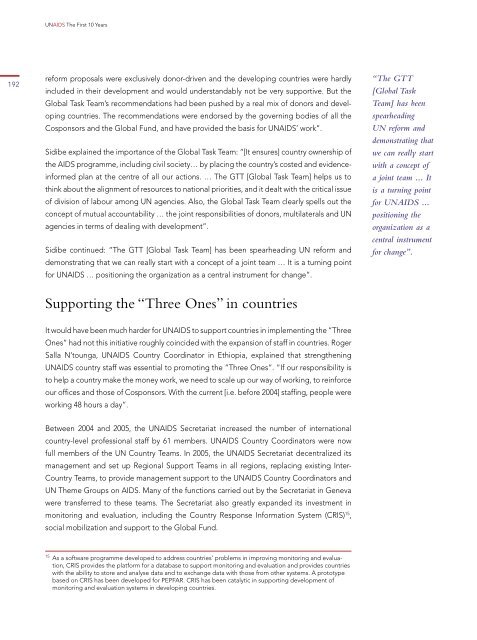UNAIDS: The First 10 Years
UNAIDS: The First 10 Years
UNAIDS: The First 10 Years
You also want an ePaper? Increase the reach of your titles
YUMPU automatically turns print PDFs into web optimized ePapers that Google loves.
<strong>UNAIDS</strong> <strong>The</strong> <strong>First</strong> <strong>10</strong> <strong>Years</strong>192reform proposals were exclusively donor-driven and the developing countries were hardlyincluded in their development and would understandably not be very supportive. But theGlobal Task Team’s recommendations had been pushed by a real mix of donors and developingcountries. <strong>The</strong> recommendations were endorsed by the governing bodies of all theCosponsors and the Global Fund, and have provided the basis for <strong>UNAIDS</strong>’ work”.Sidibe explained the importance of the Global Task Team: “[It ensures] country ownership ofthe AIDS programme, including civil society… by placing the country’s costed and evidenceinformedplan at the centre of all our actions. … <strong>The</strong> GTT [Global Task Team] helps us tothink about the alignment of resources to national priorities, and it dealt with the critical issueof division of labour among UN agencies. Also, the Global Task Team clearly spells out theconcept of mutual accountability … the joint responsibilities of donors, multilaterals and UNagencies in terms of dealing with development”.Sidibe continued: “<strong>The</strong> GTT [Global Task Team] has been spearheading UN reform anddemonstrating that we can really start with a concept of a joint team … It is a turning pointfor <strong>UNAIDS</strong> … positioning the organization as a central instrument for change”.“<strong>The</strong> GTT[Global TaskTeam] has beenspearheadingUN reform anddemonstrating thatwe can really startwith a concept ofa joint team … Itis a turning pointfor <strong>UNAIDS</strong> …positioning theorganization as acentral instrumentfor change”.Supporting the “Three Ones” in countriesIt would have been much harder for <strong>UNAIDS</strong> to support countries in implementing the “ThreeOnes” had not this initiative roughly coincided with the expansion of staff in countries. RogerSalla N’tounga, <strong>UNAIDS</strong> Country Coordinator in Ethiopia, explained that strengthening<strong>UNAIDS</strong> country staff was essential to promoting the “Three Ones”. “If our responsibility isto help a country make the money work, we need to scale up our way of working, to reinforceour offices and those of Cosponsors. With the current [i.e. before 2004] staffing, people wereworking 48 hours a day”.Between 2004 and 2005, the <strong>UNAIDS</strong> Secretariat increased the number of internationalcountry-level professional staff by 61 members. <strong>UNAIDS</strong> Country Coordinators were nowfull members of the UN Country Teams. In 2005, the <strong>UNAIDS</strong> Secretariat decentralized itsmanagement and set up Regional Support Teams in all regions, replacing existing Inter-Country Teams, to provide management support to the <strong>UNAIDS</strong> Country Coordinators andUN <strong>The</strong>me Groups on AIDS. Many of the functions carried out by the Secretariat in Genevawere transferred to these teams. <strong>The</strong> Secretariat also greatly expanded its investment inmonitoring and evaluation, including the Country Response Information System (CRIS) 15 ,social mobilization and support to the Global Fund.15As a software programme developed to address countries’ problems in improving monitoring and evaluation,CRIS provides the platform for a database to support monitoring and evaluation and provides countrieswith the ability to store and analyse data and to exchange data with those from other systems. A prototypebased on CRIS has been developed for PEPFAR. CRIS has been catalytic in supporting development ofmonitoring and evaluation systems in developing countries.
















